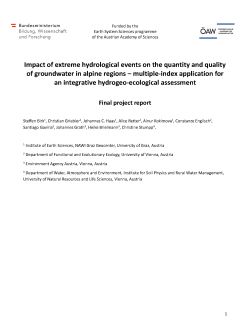|
 |
Freshwater ecosystems in mountain areas are considered important water resources and biodiversity hotspots that are highly sensitive to changes in climate. The Alpine region is known to be particularly affected by climate change, including changes in hydrological extremes such as droughts and floods, which are expected to become more frequent and intense. Despite the importance of groundwater as a primary water resource, climate change impacts on groundwater quality, including those resulting from hydrological extremes, have been rarely addressed to date. Moreover, groundwater monitoring is currently focused on physical-chemical indicators, whereas groundwater ecological features such as biodiversity and ecosystem functioning are hardly considered. Against this background, this project addressed the following overarching research question: How do groundwater systems in an alpine and prealpine environment respond to extreme hydrological events in terms of water quantity and chemical quality as well as ecological status? To address this question, the valley of the river Mur from its alpine source area at 2000 m a.s.l. to the Austrian–Slovenian border at 200 m a.s.l. was considered. Thus, the investigation area included alpine and prealpine areas, different type of hydrogeological settings and different human impacts. Existing long-term data was complemented by high-resolution monitoring over time and sampling campaigns addressing wastewater-borne micro-pollutants, microbiological parameters, and groundwater fauna. Our results demonstrate a deterioration of water quality from the alpine source area towards the foreland, corresponding to the more intense agricultural and urban land use in the foreland. The vulnerability of groundwater systems to hydrological extremes is closely related to linkages between water quantity and water quality, which are found to be determined by the groundwater recharge mechanisms and their spatiotemporal dynamics. To achieve a more holistic assessment of groundwater systems, we recommend that their ecosystem nature is taken into account by microbiological indicators that complement existing hydrological and hydrochemical indices. The B-A-(E) index is proposed for this purpose but needs further development by transciplinary research involving local experts and stakeholders to define appropriate reference conditions that enable classifications into meaningful water-quality categories.
|



 Home
Home Print
Print
 References
References
 Share
Share
